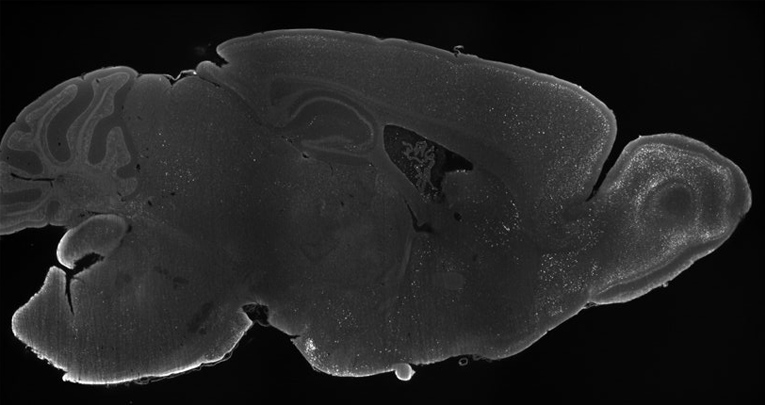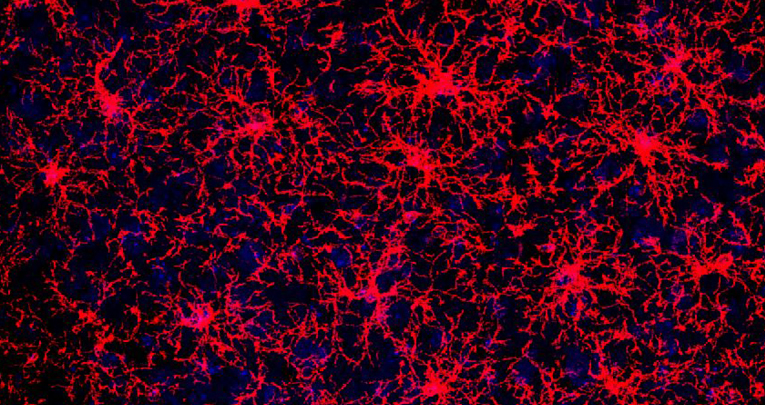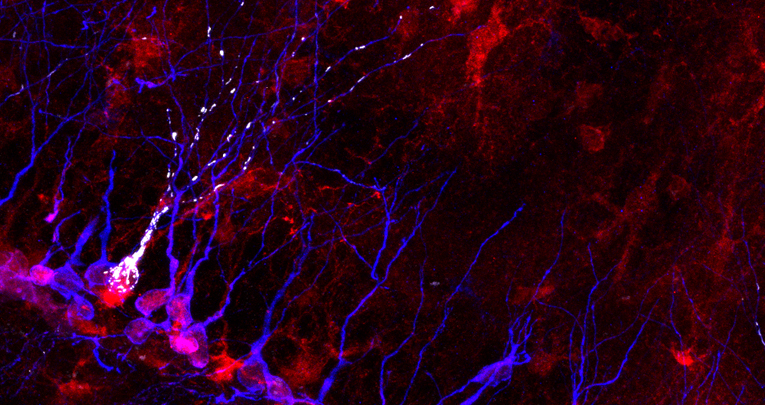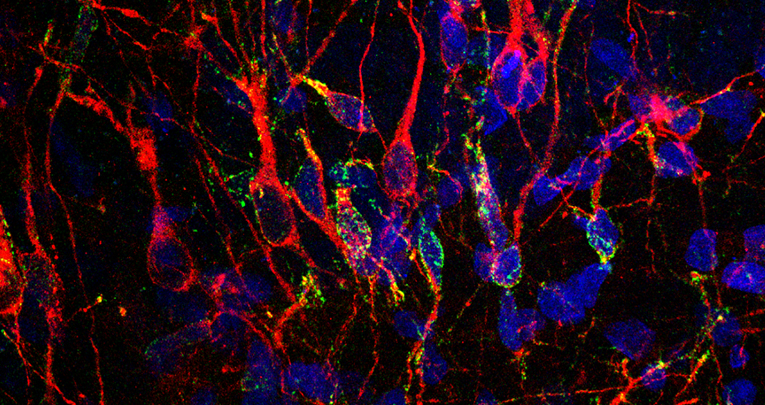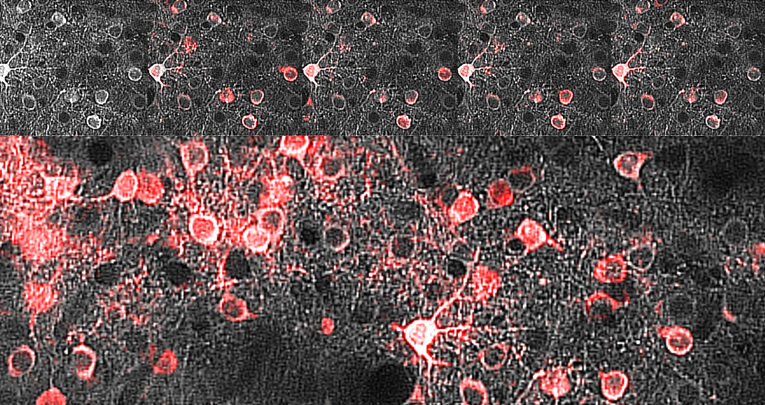Group leader: Luca Bonfanti and Paolo Peretto

Main goal
Main interest of this group is the study of persistent neurogenesis in the brain of adult mammals. Research performed by the group components has contributed to the definition of morphological, molecular, and functional features of adult neurogenic zones and neural stem cell niches.
Experimental models
The elective model of study is the subventricular zone-olfactory bulb system (SVZ-OB), which contains the primary source of neural stem cells and progenitors of the adult central nervous system (CNS) in mammals.
Two decades after the discovery of adult neurogenesis, although the SVZ-OB system remains an excellent model to investigate the issue of brain plasticity, it represents a small exception in the context of a substantially non-renewable CNS tissue, unable to self-repair after damage (vascular and traumatic lesions, neurodegenerative diseases). Hence, during the last few years, we directed our studies toward the search of alternative sources of endogenous progenitors (independent from the adult neurogenic zones) to be considered for potential therapeutical perspectives.
These studies have contributed to the identification of new, spontaneous neurogenic events in other adult mammals, such as rabbit and guinea pig, within regions which are generally considered incapable to generate neurons during adulthood (e.g. the striatum and cerebellum). This may be an example of “constitutive neurogenesis” independent from persistent germinal layers and attributable to local progenitors widely dispersed in the mature brain parenchyma.
Projects
The future lines of research are pointed in three directions:
- to further investigate the adult neurogenic zones and the stem cell niches which sustain their activity, by focussing on different aspects (identification of the stem cell elements and their progeny, determination of the functional role under both physiological condition and brain lesions, comparative analyses in different mammalian species);
-
to explore the physiological meaning of brain local parenchymal progenitors (origin, species- and age-specific distribution, subpopulations, mechanisms of activation, and functional role).
This knowledge is essential in order to understand mechanisms leading to spontaneous activation of neural progenitors and their interaction with the brain tissue; - to study activation of local progenitors (both those that are quiescent and those which sustain spontaneous neurogenesis) in different experimental and pathological conditions (chemically-induced lesions, animal models of acute and progressive neurodegeneration).
From the comparison of results obtained in diverse physiological and experimental conditions, we expect to unravel common themes and local variations in the mechanisms regulating adult mammalian neurogenesis.
The final aim could be to identify the appropriate cellular, molecular, and environmental conditions leading to possible alternative therapeutic strategies based on the exploitation of the endogenous neurogenic potential coming from both germinal layer-derived stem/progenitor cells (i.e. SVZ-OB system) and local progenitors dispersed in the mature brain parenchyma.
Methodological approaches
In vivo approaches:
- Morphological and immunocytochemical analysis of the nervous system in confocal microscopy, with special reference to cell proliferation (using endogenous and exogenous markers), cell specification/differentiation (using cell tracers and viruses), cell death.
- Ultrastructural analysis: conventional electron microscopy, immunoelectronmicroscopy using pre-and post-embedding techniques.
- Quantitative analyses and 3D reconstructions of cells and brain regions.
In vitro approaches:
- Primary cultures of the nervous system
- Tissue explants (neurogenic zones and brain parenchyma)
- Co-coltures
- Organotypic cultures
News
How do we find love?
Despite courtship has been largely characterized from an ethological point of view, how the brain orchestrates this complex mechanism is completely unknown. Dr Stefano Zucca will try to find the answer thanks to his project, awarded with the European Marie-Sklodovska Curie Postdoctoral fellowship . Dr Zucca – with the support of prof. Serena Bovetti - aims at understanding how the brain integrates information from multiple sensory modalities, by using naturalistic and ethological fundamental behaviours, such as courtship and mate selection, and where in the brain the information coming from acoustic and olfactory courtship cues isintegrated.
Not all oligodendrocyte precursors are created equal
Nature Communication , 28 April 2022
Molecular and functional heterogeneity in dorsal and ventral oligodendrocyte progenitor cells of the mouse forebrain in response to DNA damage.
Enrica Boda, Martina Lorenzati, Roberta Parolisi, Brian Harding, Gianmarco Pallavicini, Luca Bonfanti, Amanda Moccia, Stephanie Bielas, Ferdinando Di Cunto, Annalisa Buffo
Intellectual disability: Sara Bonzano wins the post-doctoral grant from the Accademia dei Lincei to unveil novel etiopathogenetic mechanisms
Dr. Sara Bonzano, post doc of the NICO research group of Adult Neurogenesis led by profs. Luca Bonfanti and Paolo Peretto, will be able to carry out the study in 2022 thanks to the post-doctoral grant awarded by the Interdisciplinary Center Linceo "Beniamino Segre" - Accademia Nazionale dei Lincei - in the field of Biomedicine.
Phylogenetic variation in cortical layer II immature neuron reservoir of mammals
eLife, 21 July 2020
Chiara La Rosa, Francesca Cavallo, Alessandra Pecora, Matteo Chincarini, Ugo Ala, Chris G Faulkes, Juan Nacher, Bruno Cozzi, Chet C Sherwood, Irmgard Amrein, Luca Bonfanti
Unravelling the neural basis of sexual imprinting
Serena Bovetti
has received a highly competitive and prestigious international grant to study the neural basis of sexual imprinting. The grant is from the
Human Frontier Science program (HFSP)
an international program of research support, funding frontier research on complex mechanisms of living organisms.
Dr Serena Bovetti works with
Prof. Paolo Peretto
at the
Department of Life Science and Systems Biology
and at the
Neuroscience Institute Cavalieri Ottolenghi – University of Turin
, and she is part of a three-person team awarded a HFSP program grant of more than $1 million US over three years.







